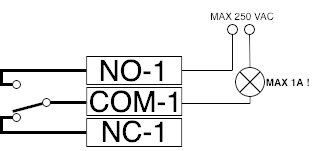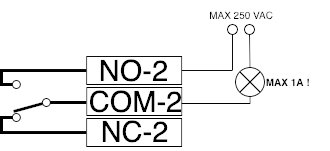-
Basics
- 1. Quick Start Guide
- 2. Device description
- 3. Safety information
- 4. Restart & reset device
- 5. Passwords
- 6. VXLAN
- 7. Firewall zones and rules
- 8. Static IP / Dynamic IP
- 9. LAN / WAN configuration
- 10. DHCP
- 11. Port forwarding
- 12. OPC UA
- 13. MQTT
- 14. Backup & Load Configuration
- 15. Flash new firmware
- 16. WWAN configuration
- 17. Watchcat
- 18. Modem
- Show Remaining Articles ( 3 ) Collapse Articles
2. Device description
The 5G-IIoT gateway is the universal platform to connect and measure data from industrial systems through 5G. The device comprises the Main unit, which can operate independently or in conjunction with other modules.
The Energy Meter module, also known as a 3-phase unit, measures the electrical data in a 3-phase supply network. The 3-phase voltages are measured via connection to VA, VB, VC, and VN. The currents are fed to IAP-IAN, IBP-IBN, ICP-ICN and INP-INN via current transformers. Based on these input signals, the 3-phase module calculates numerous values like voltages, currents, powers (active, reactive, and apparent), energies, power factors, phase shift angles, and frequencies.
It’s important to note that all three channels are independent, allowing for versatile usage. Each channel can be utilized for measuring individual loads, making it possible to monitor and measure consumption from separate consumers simultaneously.
1. Technical data
1.1 Temperature limitations
| Operating Temperature: | 0℃~50℃ |
| Storage Temperature: | -40℃~70℃ |
| Operating Humidity: | 10%~90% non-condensing |
| Storage Humidity: | 5%~90% non-condensing |
1.2 Dimensions and Weight:
| Main module: | 30*85*230 [mm], 358 [g] |
| Energy Meter module: | 30*85*93 [mm], 256 [g] |
1.3 Voltage Supply:
| Power supply: | 5-36 VDC |
| Idle electrical consumption main unit: | 2.5W (24V) |
| Idle electrical consumption main unit + 1x Energy Meter unit: | 3.0W (24V) |
| Max electrical consumption: | 20W |
| Power voltage limitation for the Main unit (L+, M) | -40V to +38V |
1.4 Measuring Inputs
| IO voltage limitation for Energy Meter unit | VA, VB, VC | -2000V to +2000V |
| IAP, IAN, IBP, IBN, ICP, ICN, INP, INN | -2V to +2V | |
| NO, COM, NC | 1000 VAC |
1.5 Energy Meter unit
| Current Maximum | 30A |
| Voltage Maximum | +-500V (353 VAC) |
| Accuracy | 2.5%, Accuracy Class B active energy (Compliance with IEC 62053-21 based on manufacturer testing) |
| Weight | 257g |
1.6 Current-measuring transformer (Energy Meter unit)
| Rated Current | 30A |
| Applicable Current | 0.1 – 50.0 A |
| Output Voltage | 100 mV |
| Current transformation ratio | 3000 |
| Output Protection | 7.5V |
| Insulation Resistance | 100 MΩ |
| Transfomer weight | 24g |
2. Connectors
2.1 Push-in CAGE CLAMP WAGO requirements
For all units in our device we use WAGO cage clamp connectors. Please ensure that your wires meet the following requirements: Wire Gauge: Use wires within the recommended gauge range for optimal connection. Insulation Type: Choose wires with insulation compatible with the connector’s clamping mechanism and operating conditions. Stripping Length: Strip wire ends to the appropriate length for secure clamping. Wire Preparation: Straighten and clean wire ends before insertion to ensure proper contact. Refer to the table below for detailed specifications:| Solid conductor: | 0.14 … 1.5 mm² / 28 … 16 AWG |
| Fine-stranded conductor: | 0.14 … 1.5 mm² / 26 … 14 AWG |
| Fine-stranded conductor; with insulated ferrule: | 0.25 … 0.75 mm² |
| Fine-stranded conductor; with uninsulated ferrule: | 0.25 … 1.5 mm² |
| Strip length: | 8 … 9 mm / 0.31 … 0.35 inches |
2.2 New units connection
To integrate a new measurement unit simply follow the procedure demonstrated on the pictures bellow to assemble an interconnection bridge between the units. ⚠️ Safety Notice: Before adding a new unit, ensure that all wires are disconnected or have no voltage. Failure to do so may result in electrical hazards or damage to the device.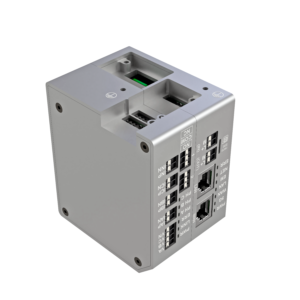
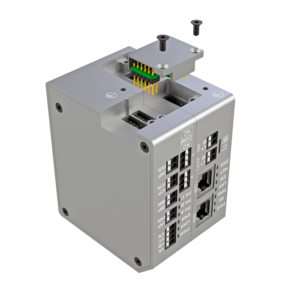
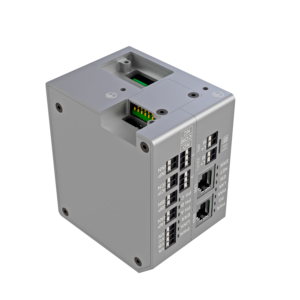
3. Front Panel Interface
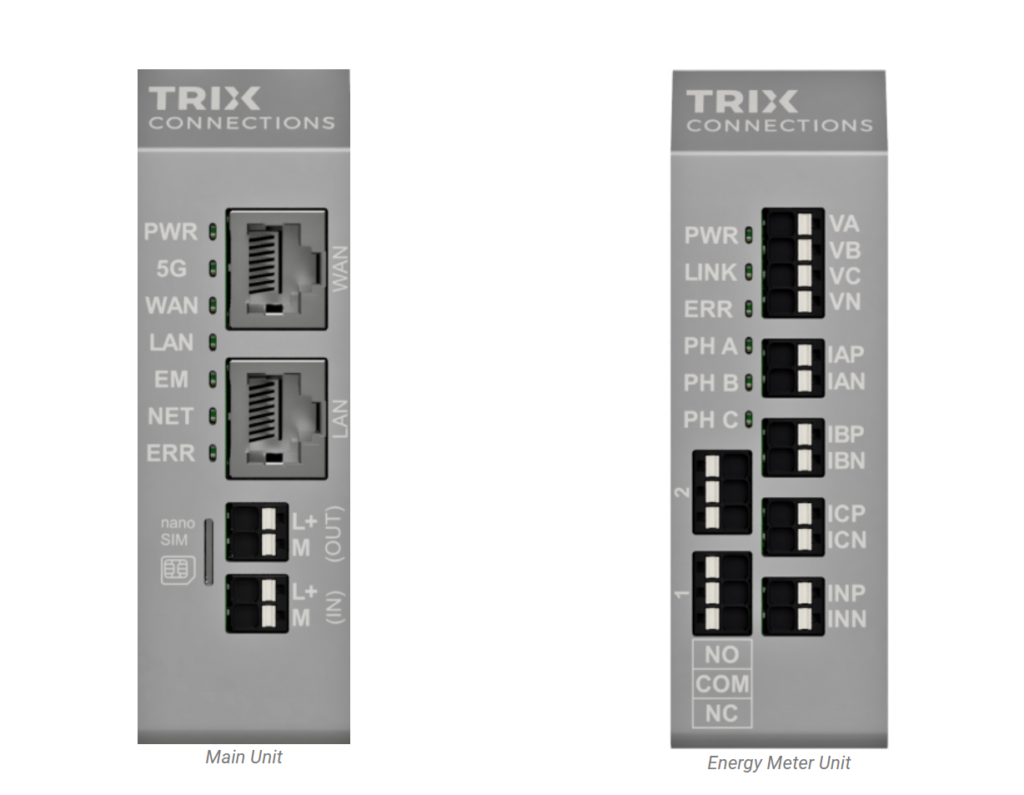
| LED | State | Meaning |
|---|---|---|
| PWR | Light | The device is ready. |
| Blinking | The device is booting up. | |
| No light | There is no power. Please check the power source. | |
| 5G | Light | The modem is on and attempting to connect. |
| Blinking | The modem is operational and the network connection is good. | |
| No light | There is no modem or it is turned off. | |
| WAN | Blinking | Communication is okay. |
| No light | There is no communication. | |
| LAN | Blinking | Communication is okay. |
| No light | There is no communication. | |
| EM | Light | The units have been initialized. |
| Blinking | There is some problem with the unit, possibly due to incorrect configuration. | |
| No light | Initialization of extension modules is in progress. | |
| NET | Light | Indicates communication with units. |
| ERR | Light | An error has occurred, or the configuration process is in progress. |
| No light | No issues have been detected. |
| LED | State | Meaning |
|---|---|---|
| PWR | Light | The device is ready. |
| Blinking | The device is booting up. | |
| No light | There is no power. Please check the power source. | |
| LINK | Light | Indicates communication with the main unit. |
| ERR | Light | An error has occurred, or the configuration process is in progress. |
| No light | No issues have been detected. | |
| PH A | Light | Voltage is detected on phase A. |
| No light | Voltage is not detected on phase A. | |
| PH B | Light | Voltage is detected on phase B. |
| No light | Voltage is not detected on phase B. | |
| PH C | Light | Voltage is detected on phase C. |
| No light | Voltage is not detected on phase C. |
5. Connection examples
5.1 Schematic connection for 5G-IIoT + Energy Meter unit
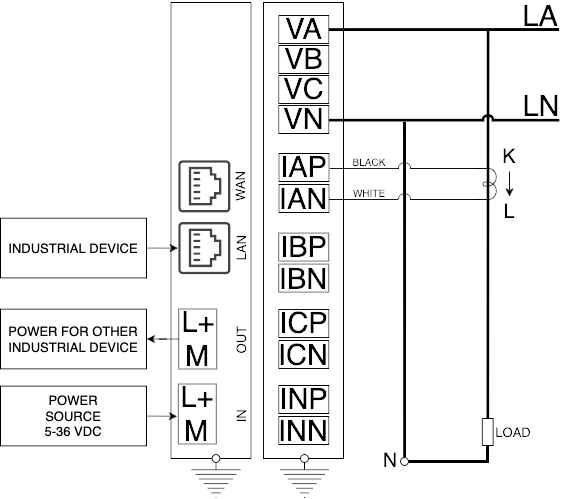
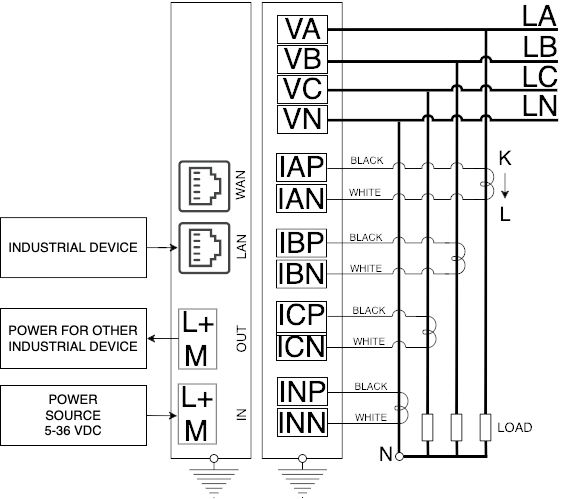
5.2 Schematic connection for relays in the Energy Meter unit
